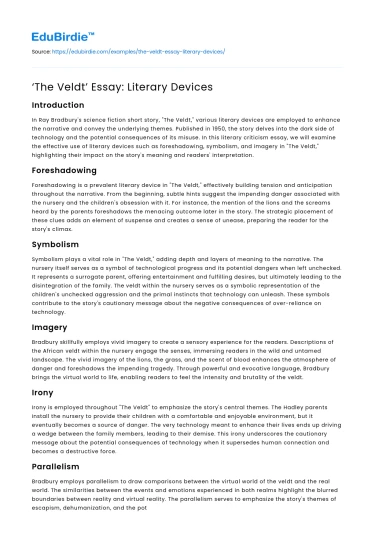Introduction
In Ray Bradbury's science fiction short story, "The Veldt," various literary devices are employed to enhance the narrative and convey the underlying themes. Published in 1950, the story delves into the dark side of technology and the potential consequences of its misuse. In this literary criticism essay, we will examine the effective use of literary devices such as foreshadowing, symbolism, and imagery in "The Veldt," highlighting their impact on the story's meaning and readers' interpretation.
Foreshadowing
Foreshadowing is a prevalent literary device in "The Veldt," effectively building tension and anticipation throughout the narrative. From the beginning, subtle hints suggest the impending danger associated with the nursery and the children's obsession with it. For instance, the mention of the lions and the screams heard by the parents foreshadows the menacing outcome later in the story. The strategic placement of these clues adds an element of suspense and creates a sense of unease, preparing the reader for the story's climax.
Save your time!
We can take care of your essay
- Proper editing and formatting
- Free revision, title page, and bibliography
- Flexible prices and money-back guarantee
Symbolism
Symbolism plays a vital role in "The Veldt," adding depth and layers of meaning to the narrative. The nursery itself serves as a symbol of technological progress and its potential dangers when left unchecked. It represents a surrogate parent, offering entertainment and fulfilling desires, but ultimately leading to the disintegration of the family. The veldt within the nursery serves as a symbolic representation of the children's unchecked aggression and the primal instincts that technology can unleash. These symbols contribute to the story's cautionary message about the negative consequences of over-reliance on technology.
Imagery
Bradbury skillfully employs vivid imagery to create a sensory experience for the readers. Descriptions of the African veldt within the nursery engage the senses, immersing readers in the wild and untamed landscape. The vivid imagery of the lions, the grass, and the scent of blood enhances the atmosphere of danger and foreshadows the impending tragedy. Through powerful and evocative language, Bradbury brings the virtual world to life, enabling readers to feel the intensity and brutality of the veldt.
Irony
Irony is employed throughout "The Veldt" to emphasize the story's central themes. The Hadley parents install the nursery to provide their children with a comfortable and enjoyable environment, but it eventually becomes a source of danger. The very technology meant to enhance their lives ends up driving a wedge between the family members, leading to their demise. This irony underscores the cautionary message about the potential consequences of technology when it supersedes human connection and becomes a destructive force.
Parallelism
Bradbury employs parallelism to draw comparisons between the virtual world of the veldt and the real world. The similarities between the events and emotions experienced in both realms highlight the blurred boundaries between reality and virtual reality. The parallelism serves to emphasize the story's themes of escapism, dehumanization, and the potential dangers of losing touch with the real world.
Conclusion
In "The Veldt" by Ray Bradbury, the skillful use of literary devices enhances the story's impact and meaning. Foreshadowing creates anticipation and tension, while symbolism adds layers of depth to the narrative, inviting readers to explore the story's themes. Vivid imagery immerses readers in the world of the veldt, while irony emphasizes the story's cautionary message. Through the effective employment of these literary devices, Bradbury successfully crafts a thought-provoking and engaging narrative that explores the dark side of technology and the potential consequences of its misuse. "The Veldt" stands as a timeless literary work that continues to resonate with readers, prompting reflection on the ever-growing influence of technology in our lives.






 Stuck on your essay?
Stuck on your essay?

